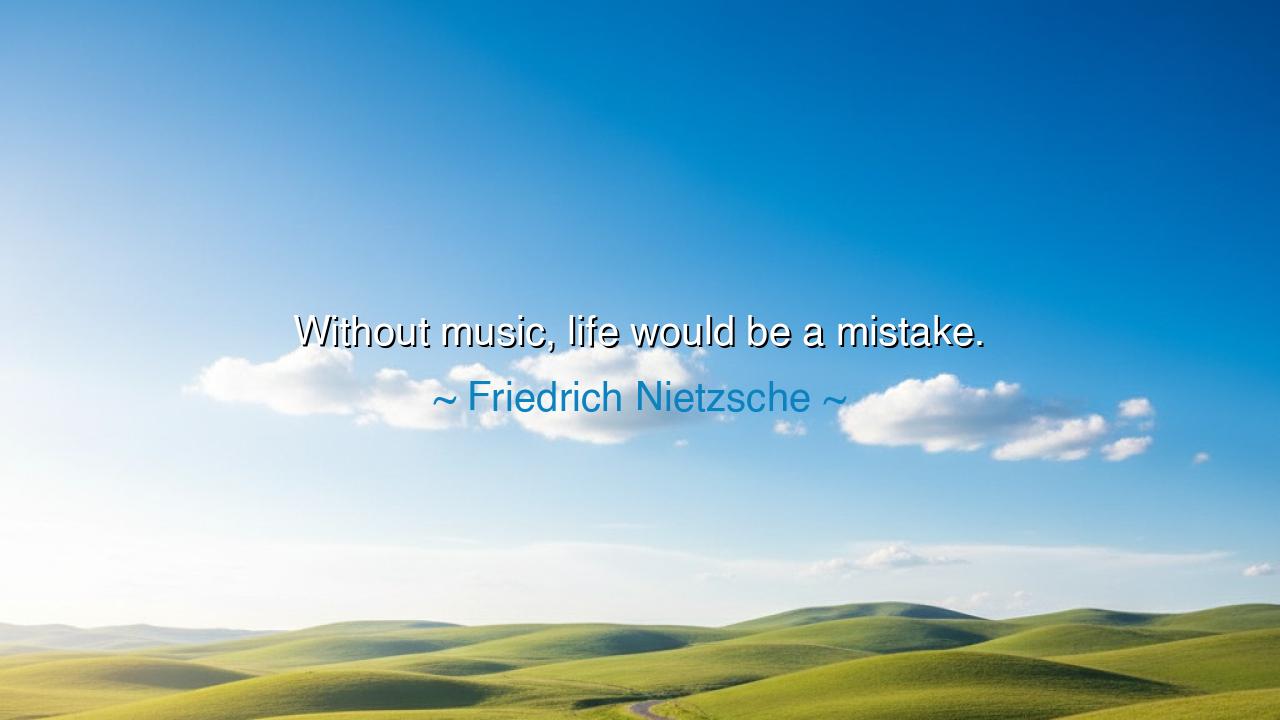
Without music, life would be a mistake.






The words of Friedrich Nietzsche — "Without music, life would be a mistake." — are thunderous in their simplicity, yet profound in their depth. To the philosopher who wrestled with despair, loneliness, and the weight of existence, music was not mere entertainment but salvation itself. In this declaration, Nietzsche reveals that life, with all its suffering and chaos, is redeemed by the beauty of song and sound. For music speaks where words falter, it gives voice to the soul’s inmost cries, and it binds humanity to something eternal. Without it, existence would feel barren, a mistake carved into the void of silence.
The origin of this truth lies in Nietzsche’s own passion for the arts. Though remembered chiefly as a philosopher, he was also a composer, a man who longed to express his spirit through melody. He believed that music was not simply sound arranged in time, but the very language of existence — a glimpse into the infinite order behind chaos. For him, music was proof that joy and pain could be woven together into harmony. He knew life was filled with suffering, but he also knew that suffering could become meaningful when transfigured into song.
History itself gives testimony to this truth. Think of Beethoven, who, even as he descended into the prison of deafness, continued to compose works that lifted the hearts of nations. He could not hear the sounds of the orchestra, yet the music thundered within him, flowing from a spirit that refused to surrender. His Ninth Symphony, with its Ode to Joy, proclaims to all generations that even in the midst of despair, one may sing. Had his life been without music, it might have collapsed into silence; but through music, it became immortal.
To call life without music a mistake is to say that such a life would be incomplete, deprived of one of the highest gifts of being human. For what else gives rhythm to labor, solace to sorrow, or ecstasy to celebration? From the songs of mothers rocking infants, to the chants of warriors on the battlefield, to the hymns of worship in sacred halls, music has always carried the weight of human experience. It is both memory and prophecy, binding us to our past and carrying us toward what lies beyond.
The ancients knew this. The Greeks believed in the music of the spheres, that the cosmos itself moved in divine harmony, and that to live well was to attune one’s soul to that eternal song. They saw that music was not only art but also discipline, a way of shaping character. Plato himself warned that the wrong kind of music could corrupt the soul, while the right kind could lead it toward virtue. Thus Nietzsche’s cry echoes the wisdom of old: music is no ornament to life, but its very core.
The lesson, then, is clear: cherish music not as a passing pleasure, but as a sacred necessity. Do not allow the days to slip by without melody. When you are weary, let music be your strength; when you are sorrowful, let it be your comfort; when you rejoice, let it magnify your joy. To neglect music is to neglect your soul.
What, then, should you do? Listen deeply. Do not let music be only background noise, but allow it to speak into your spirit. Sing even if your voice trembles, for the act itself elevates the heart. Learn to play, if you can, for in shaping sound with your own hands you enter into the divine work of creation. And above all, let your life itself become a kind of music — each choice a note, each deed a chord, each day a rhythm moving toward harmony.
Thus, let this teaching be handed down: life without beauty, life without song, life without the music of the soul is a barren thing, a mistake of wasted potential. But life filled with music — whether heard, created, or lived — becomes a symphony, echoing long after the final note has faded. And such a life is never a mistake, but a triumph.






AAdministratorAdministrator
Welcome, honored guests. Please leave a comment, we will respond soon